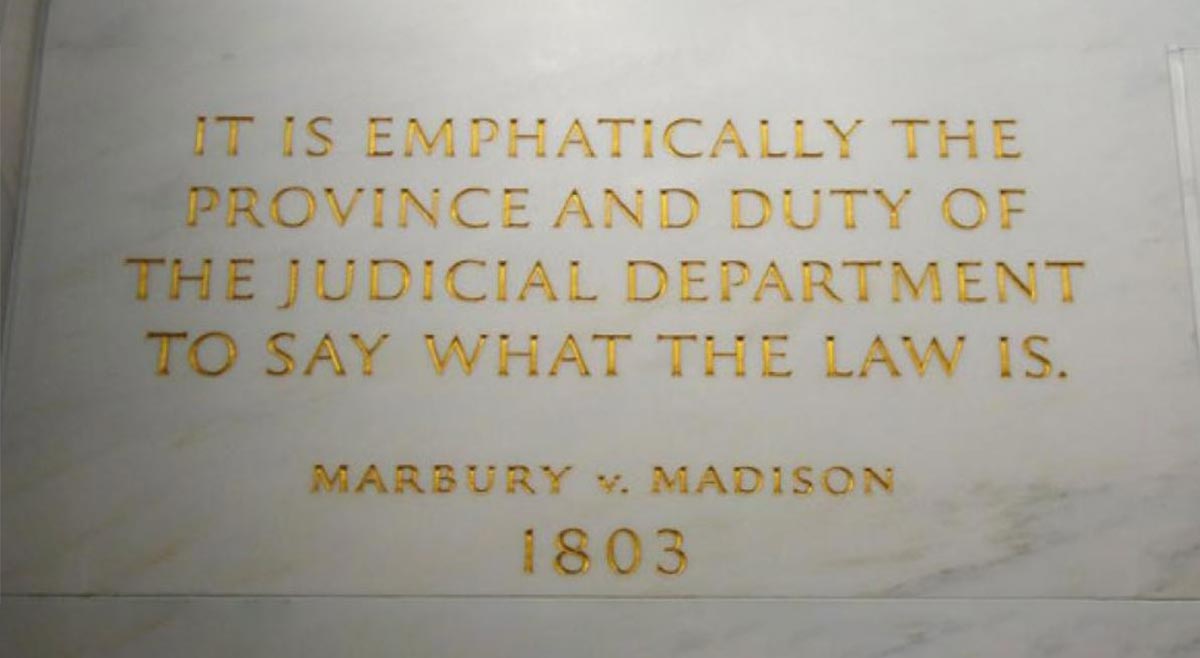Marbury v. Madison
September 12

ENSURING THE RULE OF LAW
Perhaps the most important decision ever issued by the United States Supreme Court, Marbury v Madison addressed the issue of whether an act passed by Congress in conflict with the Constitution was valid. Ironically, the law at issue granted the United States Supreme Court original jurisdiction to hear a case (a writ of mandamus) brought by a judge who had been appointed by the prior President (John Adams) but who the current President (Thomas Jefferson) refused to provide the necessary paperwork to be seated. In an opinion written by Jefferson’s distant cousin – and nemesis – the Supreme Court found that the law granting them the authority to the hear the case to be unconstitutional and dismissed the case.
Chief Justice John Marshall first explained that “The government of the United States has been emphatically termed a government of laws, and not of men.”
Marshall also explained that under the doctrine of separation of powers and the inherent judicial power of the Supreme Court, that the Supreme Court would be the final arbitrator of what the law means:
It is emphatically the province and the duty of the judicial department to say what the law is. Those who apply the rule to particular cases, must of necessity expound and interpret that rule. If two laws conflict with each other, the courts must decide on the operation of each. . .
This is the very essence of judicial duty.
Because the Constitution was the paramount law of the land ratified by the people, Marshall found that Congress could not alter it through mere legislation: “It is a proposition too plain to be contested, that the constitution controls any legislative act repugnant to it; or, that the legislature may alter the constitution by an ordinary act.” Marshall continued, “Between these alternatives there is no middle ground. The constitution is either a superior paramount law, unchangeable by ordinary means, or it is on level with ordinary legislative acts, and, like other acts, is alterable when the legislature shall please to alter it.”
Those who oppose judicial review, Marshall explained, “would subvert the very foundation of all written constitutions.” Such a theory “reduces to nothing what we deemed the greatest improvement on political institutions, a written constitution…”
“Thus,” Marshall continued, “the particular phraseology of the Constitution of the United States confirms and strengthens the principle, supposed to be essential to all written constitutions, that a law repugnant to the constitution is void; and that courts, as well as other departments, are bound by that instrument.”
Marbury v Madison established the bedrock principles that the Constitution would govern the affairs of the government of the America, and that the Supreme Court would be the guardian of the supreme law of the land.

The Patriot Week Foundation achieved its 501(c)(3) status in December 2012 and has moved forward by building a sustainable, nonpartisan organization. Currently staffed with an Operations Manager and Education Consultant, the Patriot Week Foundation will be adding to its complement of talent shortly.
This unique, historically grounded, non-partisan approach is desperately needed in our toxic political environment. In no small measure, the fate of the nation depends on it.
Get in Touch
Fill out the form, our team will get back to you ASAP.

